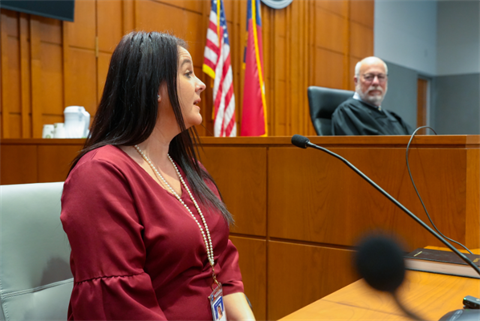DHS Child Support Services finds success through equity, diligence
Published on August 25, 2023

Even after the initial filings and verification sessions and court hearings and order enforcement and all the other components of the job, the true focus remains clear.
It’s right there in the name: child support.
Judging by the accolades this past week, members of the Cabarrus County Department of Human Services (DHS) Child Support team have a strong understanding of that focus.
On August 21, the group was honored at the Board of Commissioners Regular Meeting (August is Child Support Awareness Month). The resolution noted that the department collected $12.3 million and worked nearly 5,300 cases that supported more than 5,000 children between July 2022 and June 2023.
Later in the week, the team received several awards at the yearly state conference, including an honor for being the only county in the state to meet or exceed all federal self-assessment and incentive goals for three years in a row.
At the same event, Administrative Specialist Kimberly Gravely was named North Carolina Child Support Services Front Line Employee of the Year.
“I’m honored to work with employees who are so committed to excellence,” says department Manager Susan Dillon. “This staff delivers high-quality work while focusing on exceptional customer service. I am continually inspired by their hard work and love of this program.”
In addition to supervisors, the Cabarrus Child Support team has eight enforcement agents, two establishment agents and four interstate agents (for cases that cross state lines).
The job is equal parts negotiator, investigator and counselor. And it’s one that’s often misunderstood.
Several team members recently discussed the job and its challenges and rewards.
Application and establishment
Cases arrive in a variety of ways, according to Establishment Agent Mandy Endicott.
Some benefits received through DHS require compliance with child support. Some cases need enforcement of an existing support order. Some are filed because the custodial parent is searching for the other parent. Endicott says the department doesn’t work “locate only” cases, so once the parent is found, the case continues.
Workers have 20 days after an application is filed to build a case and start the process. Then the case goes to establishment.
At that point, “I’m going to go through it to see what other information I might need,” Endicott says. “Do I have the birth certificate? Do I have the marriage record if they were married?”
She then contacts the applicant for any other needed information.
A state-issued worksheet tallies income and expenses for the custodial parent (plaintiff) and non-custodial parent (defendant) and arrives at a recommended number.
“It puts responsibility on both parties,” Endicott says.
A letter is issued to the non-custodial parent, requesting response within 10 days and offering settlement outside court. A small percentage of those cases are handled outside court—Endicott estimates about 10 percent.
The case then enters the court process. “Once I get the case, I’m going to follow it through until we get an order for child support,” she says.
Assisting in what can be a difficult process is one of the perks of the job, Endicott says.
“It’s great just knowing that you’re taking a stressful time for people and making it a little bit easier,” she says. “Court can be very intimidating, and us coming in as a neutral party and being willing to guide both the plaintiff and the defendant through the process is rewarding.”
Enforcement and modification
Once a judge issues an order, enforcement begins.
Lisa Fant, who has a 20-year career in child support and recently joined the Cabarrus team, works as an enforcement agent. Fant’s role is important when the non-custodial parent fails to make court-ordered payments.
“Our responsibility is to make sure those payments start again,” she says. “When things change, we identify what’s going on and take the necessary action.”
That can mean using tactics like wage garnishment or tax refund interception.
But Fant says she does her best to work with those involved. She’s even helped struggling non-custodial parents find work.
“People fall down sometimes,” she says. “Our job is to help them get back up. The goal is to get funds to the mother or father—and ultimately the child—that needs those funds. That’s what I’m here for.”
In cases where circumstances change, like a promotion or job loss, a modification request can be filed.
Kelly Batalha is responsible for handling those situations.
During a review, agents distribute verification notices. If those aren’t returned, Batalha then must verify income, expenses and other factors. From that, the worksheet is completed and the parties are asked to review and agree with the amount or show proof of discrepancies.
Originally from a banking background, Batalha found a role in human services and worked her way through a variety of positions before joining the child support team.
Her current role fits her personality perfectly, she says. She takes pride in her ability to serve as a neutral party.
“Whether it’s the custodial or non-custodial parent, I give each party the same time and attention,” she says. “I want to make sure I’m doing the best job for each of them based on the guidelines we work from.”
Lead Agent Michelle Stapula handles certain specialized cases and does quality assurance. Stapula began her career in Ohio and served Cabarrus as an enforcement agent until her recent promotion.
Since it’s her job to maintain the department’s high-performance level, she may have the best viewpoint about what makes the department so special.
Stapula believes the success can be attributed to a deep and diverse knowledge of the job, a strong team mentality and the wide-ranging pride individuals take in their work.
Also: “I can tell you that every person that works here has a heart of gold,” she added.
Learn more about the department and find links to state child support publications here.